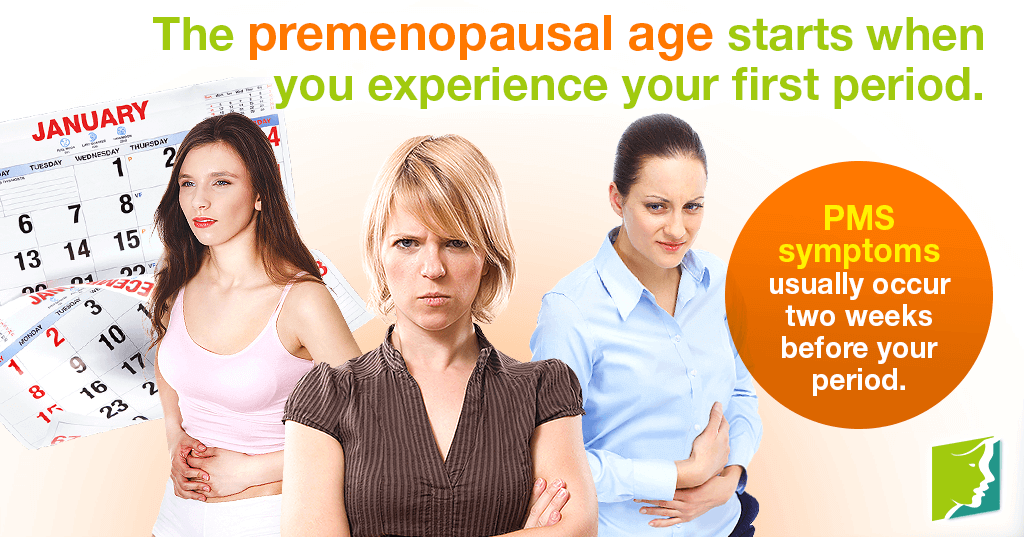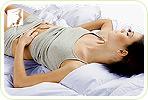The premenopausal age can be defined as the entire reproductive period of your life before you start experiencing the symptoms of menopause. During premenopause, your periods are typically regular, you are able to bear children, and sex hormones - such as estrogen and progesterone - have reached stable levels. This period of your life will last until you enter perimenopause.
When Do Symptoms Start?
The premenopausal age starts when you experience your first period during puberty. A girl may experience her first period anytime between the ages of 8 and 15 years, though the average age for a girl to begin menstruation is 12 years. At this point, you should start having a normal menstrual cycle, with periods ranging from 21 - 35 days apart.
What Are the First Symptoms?
With periods often comes premenstrual syndrome (PMS). PMS refers to the symptoms that are associated with the menstrual cycle during the premenopausal age. PMS symptoms usually occur one to two weeks before your period and disappear once your period starts.
Acne. Hormonal changes throughout puberty and the menstrual cycle often cause acne lesions to appear on the face, neck, back, chest, and shoulders of women. Acne usually gets better over time.
Irregular periods. In the first years of menstruation, women typically experience longer or irregular menstrual cycles.
Mood swings. Mood swings are a normal part of PMS.
Bloating. It is common for women to retain water in the weeks before their period, causing a heavy, bloated feeling. This is a normal symptom of PMS.
Relieving Premenopause Symptoms
The majority of premenopause symptoms are a normal part of the female reproductive cycle. Some symptoms, such as acne and irregular periods, will likely improve over time. However, if your acne is especially severe, you may wish to consult a doctor. Likewise, if your periods become especially irregular, absent, or heavy, it is recommended that you see your doctor.
PMS varies in severity; however, for mild symptoms, there are simple diet and lifestyle changes that can help you to manage PMS.
Diet
Eating a healthy, balanced diet with lots of fruits and vegetables is essential to managing PMS symptoms. Avoid alcohol and caffeine, which can alter your mood and energy levels. Moreover, monitor your salt intake, as salt has been linked to fluid retention and bloating.
Exercise
Engaging in regular exercise can help to relieve stress, boost energy levels, and improve overall health. Try to do at least 150 minutes of moderate exercise - such as swimming, walking, or cycling - every week.
Additional Help
Calcium, vitamin D, and magnesium supplements may help to reduce some symptoms of PMS. However, if your PMS symptoms are particularly severe, you may wish to consult with a physician, especially if your mood and mental health are greatly affected.
Most symptoms experienced during the premenopausal age are a natural part of the reproductive cycle and should be expected to persist until you enter the menopause transition. If symptoms are especially severe, there are methods of managing them. However, it is important to note that some regular symptoms are indicative of good reproductive health.
Sources
- National Health Service UK. (2013). Symptoms of premenstrual syndrome (PMS). Retrieved November 15, 2016, from http://www.nhs.uk/Conditions/Premenstrual-syndrome/Pages/Symptoms.aspx
- National Health Service UK. (2013). Treating premenstrual syndrome (PMS). Retrieved November 15, 2016, http://www.nhs.uk/Conditions/Premenstrual-syndrome/Pages/Treatment.aspx
- National Health Service UK. (2016). Vaginal Discharge. Retrieved November 15, 2016, from http://www.nhs.uk/Conditions/vaginal-discharge/Pages/Introduction.aspx
- Office on Women's Health. (2012). Acne fact sheet. Retrieved November 15, 2016, from https://www.womenshealth.gov/publications/our-publications/fact-sheet/acne.html
- Office on Women's Health. (2014). Menstruation and the menstrual cycle fact sheet. Retrieved November 15, 2016, from https://www.womenshealth.gov/publications/our-publications/fact-sheet/menstruation.html



